City Council Campaign Finance Crosses Wards
A preliminary analysis of pre-primary campaign finance reports for the four contested races in the Aug. 7 Ann Arbor city council Democratic primary shows a total of $53,050.25 in cash was raised by the eight candidates combined, with the average donor contributing a bit over $100.
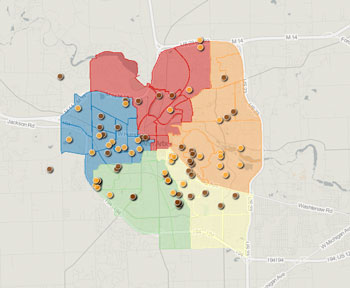
Shaded areas indicate Ann Arbor’s five wards. Colored dots denote the address of a donor to a campaign – brown for one candidate and orange for the other candidate. Which ward’s race does this map show? Details below.
The two candidates in Ward 5 raised a combined total greater than any other ward – with Chuck Warpehoski raising $9,558 and Vivienne Armentrout receiving about $2,000 more, at $11,350. Warpehoski’s total came from a significantly greater number of donors than Armentrout’s contributions, but were on average much smaller. Armentrout and Warpehoski are competing for the Democratic nomination and will face Republican Stuart Berry in November. Sitting Ward 5 Democrat Carsten Hohnke decided not to seek re-election.
Raising slightly less than Ward 5 candidates were incumbent Ward 2 councilmember Tony Derezinski ($8,475) and challenger Sally Petersen ($7,947). The distribution of donation sizes was similar for the Ward 2 candidates, and both showed a much higher per-donor average than the citywide figure – $163 for Derezinski and $139 for Petersen.
In Ward 4, Democratic primary voters will have the same choice they had in 2010 – between incumbent Margie Teall and challenger Jack Eaton. This year, they have raised roughly the same amount of money – Teall with $4,685 and Eaton with $4,305.
Ward 1 showed the greatest difference in the amounts raised by the two candidates, as Sumi Kailasapathy raised about 70% more than Eric Sturgis – $4,220 compared to $2,510 for Sturgis. The seat will be open because Sandi Smith is not seeking re-election.
A common theme across all the campaign finance reports is the significant support candidates receive from outside the ward they’re seeking to represent. That’s a trend visible in the maps we present after the jump.
Part of that trend can be explained by the number of city residents who donate money to more than one campaign. Out of the nearly 500 different donors across the eight campaigns, 58 donated to two or more campaigns, and 23 donated to three or more. The Chronicle counted nine donors who contributed to four different city council campaigns.
Many observers perceive a grouping of candidates based on shared basic philosophies – Kailasapathy, Petersen, Eaton and Armentrout on the one hand, contrasted with Sturgis, Derezinski, Teall and Warpehoski. While there’s likely considerable room for disagreement about what the common thread is that ties those candidates together, the multiple-campaign donors bear out a perception of some commonality: Of the 58 multiple-campaign donors, all but three squared up with that candidate grouping.
The three donors identified by The Chronicle as flouting that grouping included 22nd circuit court judge candidate Carol Kuhnke, who gave money to both Ward 2 candidates (Derezinski and Petersen) as well as Sturgis and Teall. Past Ward 2 candidate Stew Nelson gave money to Petersen and to Sturgis. And former Ann Arbor Downtown Development Authority board member Ed Shaffran donated to Teall and to Armentrout.
Which group had more multiple-campaign donors? There the nod goes to the group with no incumbents – Kailasapathy, Petersen, Eaton and Armentrout – with 39 of the 58 multiple-campaign donors.
Vignette from the County Clerk’s Office
On Friday, July 27, with the filing deadline for pre-primary campaign finance reports about 15 minutes away, folks in the waiting area at the Washtenaw County clerk’s office got a reminder that the county clerk holds an elected position.
Washtenaw County clerk Larry Kestenbaum emerged from behind the counter, took a seat in the waiting area and chatted with The Chronicle a bit before handing in his pre-primary campaign finance filing. He noted that he always hands in his election paperwork from that side of the counter.
Kestenbaum’s staff then took his paperwork, disappeared into a back office, and a few minutes later, the documents were scanned and uploaded to the clerk’s campaign finance database, available for perusal by the public.
One topic of conversation with The Chronicle was speculation about whether all the candidates for Ann Arbor city council would submit their paperwork before the deadline. Only one of the eight candidates in the contested primary races had not filed by then – Vivienne Armentrout. Armentrout wrote to The Chronicle later to report that she’d emailed the clerk’s office to let them know she wouldn’t be filing that day. When she files on Monday, she’ll need to pay a relatively minor fine – $25. Failure to file for a longer period could get expensive – because the fine is $25 per day.
Even though she did not make the Friday deadline, Armentrout forwarded her data to The Chronicle later that evening, which was used in the analysis for this article.
Distribution of Donations
For all bar graphs with donation distributions, the images are linked to a higher resolution file. The vertical axis is scaled identically for all eight races, to allow for sensible visual comparisons across wards.
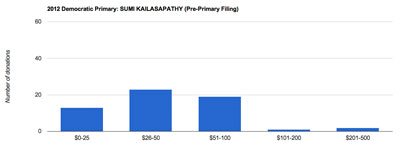
Ward 1 Sumi Kailasapathy. The Chronicle counted 58 donors, who contributed a total of $4,220 – an average of $73 per donor, and a median of $50.
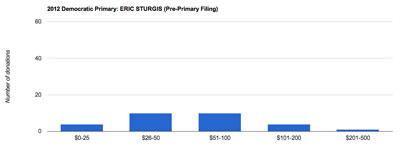
Ward 1 Eric Sturgis. The Chronicle counted 29 donors who contributed $2,510 for an average of $86.55 per donor, and a median of $75.
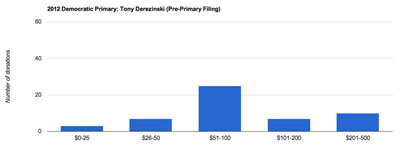
Ward 2 Tony Derezinski. The Chronicle counted 52 donors who contributed a total of $8,475 for an average of $163 per donor and a median of $100.
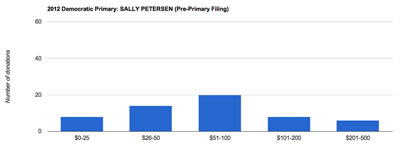
Ward 2 Sally Petersen. The Chronicle counted 57 donors who contributed a total of $7,947 for an average of $139 per donor and a median of $100.
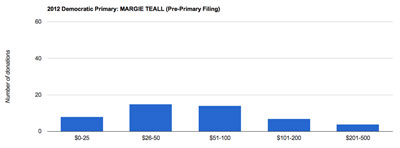
Ward 4 Margie Teall. The Chronicle counted 48 donors who contributed a total of $4,685 for an average of $97 per donor and a median of $100.
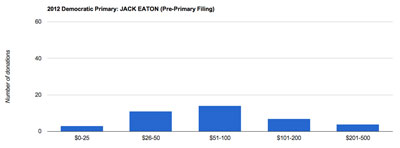
Ward 4 Jack Eaton. The Chronicle counted 39 donors who contributed a total of $4,305 for an average of $110 per donor and a median of $100.
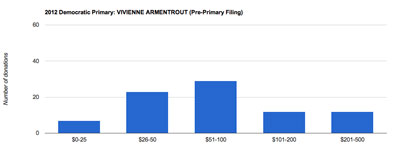
Ward 5 Vivienne Armentrout. The Chronicle counted 83 donors who contributed a total of $11,350 for an average of $137 per donor and a median of $100.
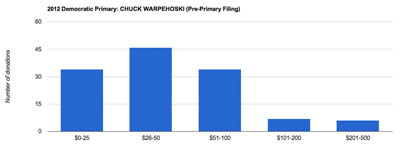
Ward 5 Chuck Warpehoski. The Chronicle counted 127 donors who contributed a total of $9,558 for an average of $75 per donor and a median of $50.
Mapping the Donation Distributions
Maps below are available in dynamic form at geocommons.com: “Ann Arbor City Council Primary 2012 Campaign Finance.” Layers corresponding to each candidate’s contributions can be toggled on and off. The geocoding for the maps (that is, the matching of longitude and latitude to street addresses) is not guaranteed to be accurate for every colored dot depicting a campaign contribution. However, The Chronicle is confident that the accuracy is adequate for claims about overall trends.
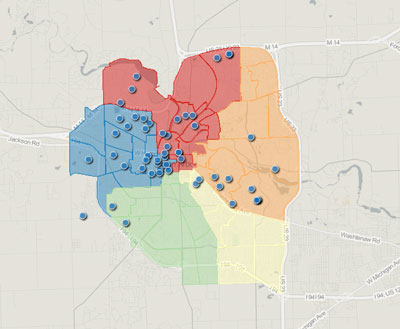
Ward 1 Sumi Kailasapathy. Ward 1 is the red shaded area. Colored dots denote the location of campaign donations. Kailasapathy enjoys a lot of support in Ward 5 (blue) as well as in the ward she’s seeking to represent.
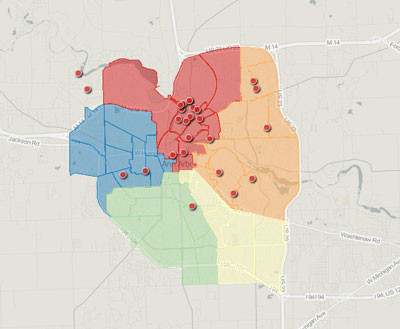
Ward 1 Eric Sturgis. Ward 1 is the red shaded area. Colored dots denote the location of campaign donations. The map shows that most of his financial support is in Ward 1, but citywide it’s sparse compared to Kailasapathy’s.
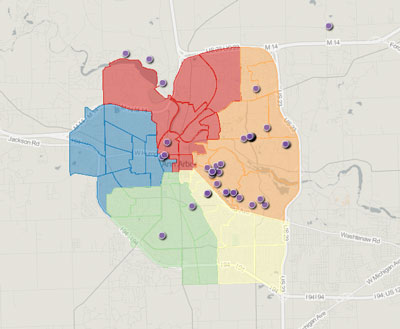
Ward 2 Tony Derezinski. Ward 2 is the light orange shaded area. Colored dots denote the location of campaign donations. Both Derezinski and Petersen draw a lot of support from the southern part of Ward 2.
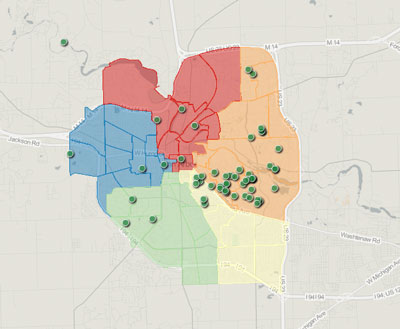
Ward 2 Sally Petersen. Ward 2 is the light orange shaded area. Colored dots denote the location of campaign donations. The northern two precincts, where former Ward 2 councilmember Stephen Rapundalo was always strongest in terms of votes, offers little financial support for either candidate this time around.
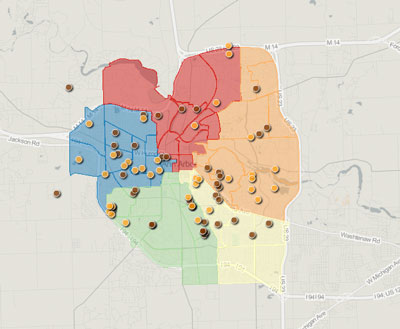
Ward 4 Jack Eaton and Margie Teall. Ward 4 is the light green shaded area. Colored dots (Teall, brown; Eaton, orange) denote the location of campaign donations. Teall and Eaton’s contributions are combined onto one map. Without additional background information, it would be difficult to guess that the map shows contributions for a Ward 4 race – as the majority of contributions come from outside the ward. The visual perception is accounted for partly by the fact that the middle swath of Ward 4 offers has no residential areas – because it’s University of Michigan property.
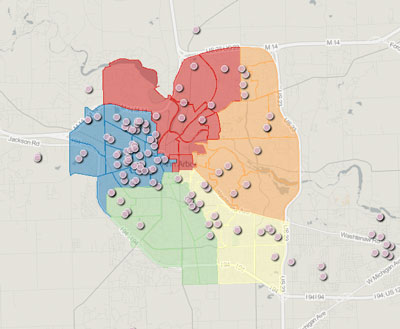
Ward 5 Chuck Warpehoski. Ward 5 is the blue shaded area. Colored dots denote the location of campaign donations. Warpehoski enjoys a lot of support within the ward, but also outside Ward 5 within the city. Outside the city, in Ypsilanti, he’s also received several contributions.
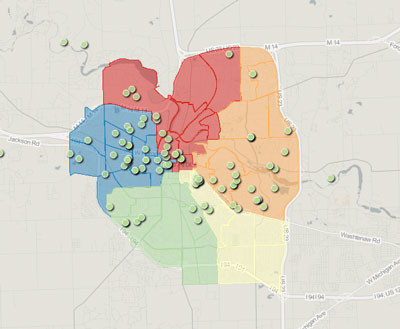
Ward 5 Vivienne Armentrout. Ward 5 is the light blue shaded area. Colored dots denote the location of campaign donations. Armentrout enjoys strong support within the ward, as well as in Ward 2 (orange). That could be explained in part by the fact that Ward 2 councilmember Jane Lumm sent out a fundraising letter to her own supporters on Armentrout’s behalf. Lumm contributed to Armentrout’s campaign as well as to the campaigns of Kailasapathy, Petersen, and Eaton.
The Chronicle could not survive without regular voluntary subscriptions to support our coverage of public bodies like the Ann Arbor city council. Click this link for details: Subscribe to The Chronicle. And if you’re already supporting us, please encourage your friends, neighbors and colleagues to help support The Chronicle, too!




Sumi Kailasapathy’s heavy financial contributions received from Ward Five, in stark contrast to Sturgis’ few donors in that ward, likely results from the Anglin/Armentrout “Townie” clique that is backing her in hopes of derailing the Council Party’s control of City Council.
She is likely the best shot at gaining a seat for the anti-development Townies on the City Council.
An intriguing analysis. It highlights the fact that there are so few active Dems in the Fourth Ward. It is bizarre, to say the least, to see that neither Fourth Ward candidacy has its financial center of gravity in the Fourth Ward!
Sure, it’s nice to be supported by people from your own ward, but I don’t know what the big deal is about people from outside a ward, but inside the city limits, supporting candidates from wards that are not the one in which they reside.
In the end, whether I get to vote for them or not, as a city resident I am affected by the votes of all city council members, whether they are in the 1st, 2nd, 3d, 4th, or 5th wards.
Ms. Kraut, I say, “yes, and then some.” Even if you live outside of the city you will be affected by decisions made here and therefore you may prefer one council person over another. Maybe your business in in AA City but your home is not. Maybe you just do business in the city and you feel that different councilmember would make your life easier. Or maybe you just feel like you are a member of this region and want what’s best for AA City. It is, after all, the center of our region.
Last time I flew over I did not see those ward lines.
Re: comments from abc and Ruth Kraut on “the big deal” about geographic distribution of campaign contributions. I don’t think anyone has advanced the idea that it’s a “big deal” that some person from outside a ward or even outside the city supports a given candidate financially. Instead, what’s been suggested (in previous comments and implicitly by the maps in the article itself) is that patterns that become clear by plotting the data out on a map are interesting.
Randomly distributed contributions from outside a ward are, well, not very interesting. And if it takes plotting the data out on a map to see there don’t appear to be visible patterns, it’s still worth the effort to verify that, yes, that’s another just plain boring set of data.
However, when the effort to map out the data does reveal clear geographic patterns of such contributions (or a lack of a pattern where you’d expect to see one) then to me at least, that’s just plain interesting.
@Dave (Cahill): The Fourth Ward used to be the most reliably Republican ward, didn’t it? The area west of Main (Lansdowne etc.), at least. Not surprising they don’t feel enthusiastic about living in a Democratic ward.
Dave, I love maps (almost became a geographer, truly) and I’m glad you put them in. I agree that they are interesting and can visually show important data. It’s just that if your main variable is “in ward” vs. “out of ward” then that creates an idea (at least in some people’s heads) that “out of ward” donations are ‘bad’ while “in ward” donations are good.